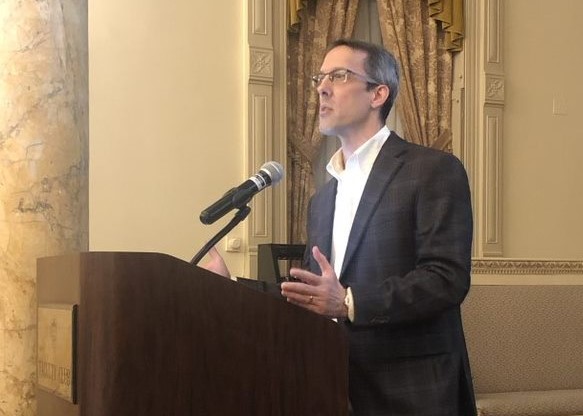New efforts to mobilize around the challenges and opportunities of AI are taking shape at McGill. On December 4, a new McGill Collaborative for AI & Society (McCAIS) held an internal launch event at the McGill Faculty Club, where more than 70 participants from across the McGill campus gathered for an afternoon of collaboration and discussion.
The event was facilitated by Professor Golnoosh Farnadi, McCAIS Co-director, and Professor Eric D. Kolaczyk, Director of the Computational and Data Systems Initiative (CDSI), which hosts McCAIS. Attendees included Dean of Music Sean Ferguson, Dean of Arts Lisa Shapiro, Dean of Science Bruce Lennox, Dean of Desautels Faculty of Management Yolande Chan, Dean of the School of Continuing Studies Carola Weil, and Interim Dean of Education Victoria Talwar.

“While initially viewed as a technology to be developed and advanced by a selected group with specific backgrounds in AI, the noticeable effects of AI on all aspects of society, along with its potential risks and harms, have convinced me that we need to reconsider our approach to AI,” Farnadi said. “McCAIS represents a collaborative effort to bridge this gap, advocating for interdisciplinary research across universities to ensure that all perspectives from diverse backgrounds are considered and welcomed in the development of AI.”
Presentations from guest speakers – including professors from six faculties, a librarian, and undergraduates from the McGill AI Society – were complemented by two roundtable sessions. Discussion questions centered around the future role of McCAIS and how it might support the McGill community in response to the landscape of rapidly changing AI technologies. The feedback collected will be used to inform the future efforts and direction of McCAIS.
McCAIS evolved out of a six-month scoping process, led by the CDSI, that highlighted the need to foster a holistic approach in addressing the intersection of AI and society.
“What we face with AI is more than technological in nature,” Kolaczyk said. “McCAIS aims to facilitate the strategic integration of McGill’s distributed strengths around AI in order to address, with both agility and care, the questions around who, what, where, when, why, and how AI interacts with society.”
The Collaborative’s initial efforts will center around four objectives: to disseminate expertise around AI and society, build capacity for increased agility in the development and adoption of AI, augment traditional coursework, and develop frameworks for the upskilling and reskilling needed to prepare an AI-ready society.
“What we’re experiencing in the release of large language models like ChatGPT is one of the fastest introductions of a disruptive technology society has ever witnessed,” Lennox said. “Under the umbrella of the CDSI, which provides the core infrastructure and mechanisms, we have all the elements that make it possible to approach these crucial questions in a way that only a university can in 2023.”
The CDSI was formally launched in 2022 with the goal of facilitating interdisciplinary collaboration within the McGill community at the intersection of computing, data, and systems. The CDSI hosts workshops, provides advice and support to the McGill community through the Data Science Solutions Hub (DaS2H), and supports research efforts in which computational and data systems are central. In the 2022-2023 academic year, the CDSI hosted 39 workshops with over 1200 total participants, covering topics like introductory programming skills, data visualization, and machine learning.
Looking to the future, McCAIS recently put out a call for a second Co-director to work alongside Professor Farnadi.
“The coming years are expected to be defining for both AI and our society,” Kolaczyk said. “McCAIS allows us to channel the rich and diverse spectrum of AI-related expertise at McGill to play a formative role in helping shape what our best tomorrow will look like.”
To learn more about McCAIS, visit the CDSI website here.
